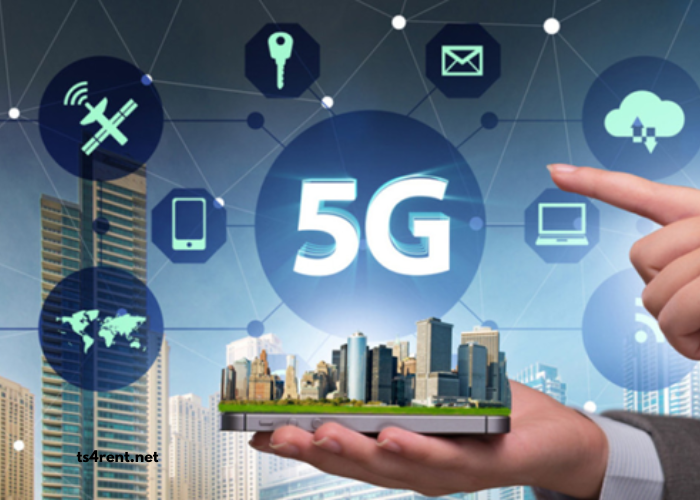The rapid evolution of mobile technology has drastically reshaped the way we live, work, and interact. One of the most anticipated technological advancements in recent years is the introduction of 5G technology, the fifth generation of mobile network systems. As the successor to 4G, 5G promises to revolutionize connectivity worldwide, offering faster speeds, lower latency, and improved reliability. But its implications go far beyond just faster internet; 5G technology is set to play a pivotal role in global connectivity, unlocking new opportunities across various industries, from healthcare to transportation to entertainment.
In this article, we will explore the significance of 5G technology, its potential benefits, and how it is transforming global connectivity.
Understanding 5G Technology
Before delving into the role of 5G in global connectivity, it’s important to understand what 5G is and how it differs from previous generations of mobile networks.
What is 5G?
5G, short for “fifth generation,” is the latest standard for cellular networks. It is designed to provide faster data speeds, lower latency, and more reliable connections compared to its predecessors, such as 4G (LTE). While 4G revolutionized mobile internet by enabling video streaming and fast browsing, 5G takes things a step further by supporting speeds up to 100 times faster than 4G, with latency (the delay in data transmission) reduced to mere milliseconds.
5G achieves these improvements through the use of advanced technologies like millimeter waves, small cells, massive MIMO (multiple input, multiple output), and beamforming. These innovations allow 5G networks to deliver faster, more reliable, and more efficient connections to an ever-increasing number of devices.
Key Features of 5G
- Increased Speed: 5G networks offer download speeds that can reach up to 10 Gbps, enabling seamless high-definition streaming, real-time gaming, and quick downloads.
- Low Latency: Latency, the delay between sending and receiving data, is reduced to as low as 1 millisecond with 5G, making real-time applications, like virtual reality (VR) and autonomous vehicles, possible.
- Massive Connectivity: 5G can support a large number of devices simultaneously, making it ideal for the growing Internet of Things (IoT) ecosystem, where billions of connected devices need to communicate with each other.
- Enhanced Reliability: 5G networks offer improved reliability, ensuring that critical applications, such as healthcare systems and autonomous transportation, remain functional even in high-demand scenarios.
With these features, 5G is not just an incremental upgrade from 4G but a game-changer that has the potential to transform how we connect to the internet and to each other.
The Role of 5G in Global Connectivity
5G technology is set to reshape global connectivity in profound ways. As it becomes increasingly available around the world, it will bridge gaps in connectivity, enhance productivity, and open new avenues for innovation. Let’s take a closer look at how 5G is playing a key role in global connectivity.
Facilitating Digital Transformation
One of the most significant impacts of 5G technology is its ability to drive digital transformation across industries. By providing faster internet speeds and more reliable connections, 5G enables businesses to leverage cutting-edge technologies such as artificial intelligence (AI), machine learning, big data analytics, and the Internet of Things (IoT) at an unprecedented scale.
Enhancing Remote Work and Collaboration
In a post-pandemic world, remote work and virtual collaboration have become the norm for many businesses. 5G enhances the remote working experience by providing faster internet speeds, reducing latency, and ensuring stable connections for video conferencing and cloud-based tools. As a result, employees and teams across the globe can collaborate seamlessly, regardless of their physical location.
Empowering Smart Cities
The concept of “smart cities” has gained significant traction in recent years. These cities leverage advanced technologies to optimize infrastructure, improve public services, and enhance the quality of life for their residents. 5G plays a crucial role in enabling smart city initiatives by providing the connectivity needed to support a wide array of smart devices, such as traffic sensors, smart streetlights, and environmental monitoring systems. With 5G, smart cities can improve urban planning, reduce traffic congestion, and enhance public safety.
Bridging the Digital Divide
One of the most important ways 5G technology is impacting global connectivity is by helping bridge the digital divide. In many parts of the world, especially in rural or underserved areas, access to high-speed internet has been limited. 5G has the potential to provide high-speed connectivity in these areas, enabling people in remote regions to access the same digital resources as those in urban centers.
Expanding Internet Access in Rural Areas
5G’s ability to deliver high-speed internet through wireless networks makes it an ideal solution for providing internet access to rural areas where traditional broadband infrastructure may be unavailable or cost-prohibitive to install. By deploying 5G towers and small cells, internet service providers can extend broadband services to underserved regions, connecting more people to the global digital economy.
Connecting the Unconnected
According to the International Telecommunication Union (ITU), more than 3 billion people around the world remain unconnected to the internet. 5G has the potential to reduce this gap by offering low-cost, high-performance wireless internet solutions in developing regions. Through partnerships between governments, mobile operators, and tech companies, 5G networks can be used to bring internet access to remote areas, empowering individuals with the tools they need to access education, healthcare, and employment opportunities.
Enabling the Internet of Things (IoT)
The Internet of Things (IoT) refers to the growing network of interconnected devices, ranging from smart thermostats to industrial machinery. 5G’s high speed, low latency, and massive device connectivity capabilities make it the perfect enabler for IoT applications.
Smart Homes and Personal Devices
With the advent of 5G, smart homes are becoming more efficient and interconnected. Devices like smart refrigerators, security cameras, and voice assistants can work seamlessly together, improving the convenience and energy efficiency of our homes. 5G’s low latency ensures that commands and feedback are transmitted instantly, making interactions with smart devices more responsive and intuitive.
Industrial IoT (IIoT)
5G is also playing a crucial role in the industrial sector by enabling the Industrial Internet of Things (IIoT). In industries such as manufacturing, logistics, and energy, 5G-powered IoT solutions can optimize processes, improve supply chain management, and enable predictive maintenance. For example, sensors connected via 5G can monitor the condition of machines in real time, alerting operators to potential issues before they lead to costly breakdowns.
Advancing Healthcare and Telemedicine
Another sector that stands to benefit greatly from 5G is healthcare. With its high-speed data transmission and low latency, 5G is enabling new innovations in telemedicine, remote patient monitoring, and even surgery.
Real-time Remote Consultations
Telemedicine has grown exponentially in recent years, allowing doctors to consult with patients remotely. 5G’s low latency ensures that video consultations are smooth and free of delays, enabling healthcare professionals to offer high-quality care from any location. This is particularly important in rural areas where access to specialists may be limited.
Remote Surgery
5G also holds the potential to revolutionize surgery by enabling remote surgery. Surgeons can operate on patients from thousands of miles away using robotic systems controlled in real time over 5G networks. This could open the door to life-saving procedures for patients in underserved or remote regions, where access to top-tier healthcare professionals is scarce.
Revolutionizing Transportation and Autonomous Vehicles
The transportation sector is poised for a significant transformation with the rollout of 5G. Autonomous vehicles, drones, and connected transportation infrastructure all require ultra-reliable, low-latency networks to operate effectively.
Autonomous Vehicles
Autonomous vehicles rely on constant communication with their environment to navigate safely. 5G’s low latency ensures that vehicles can respond to real-time data, such as traffic conditions and road hazards, almost instantly. By enabling fast and reliable communication between vehicles and infrastructure, 5G will help accelerate the deployment of autonomous cars and trucks, making transportation safer, more efficient, and more environmentally friendly.
Smart Transportation Systems
5G can also improve urban transportation systems by enabling the development of smart traffic management systems. These systems can use real-time data from sensors and cameras to optimize traffic flow, reduce congestion, and minimize environmental impact.
The Global Economic Impact of 5G
The widespread adoption of 5G is expected to have a profound impact on the global economy. According to a study by IHS Markit, 5G will contribute nearly $13 trillion to the global economy by 2035. This economic growth will be driven by the creation of new industries, the expansion of existing ones, and the increasing demand for high-speed connectivity in everyday life.
Job Creation and Economic Growth
The deployment of 5G networks will create millions of jobs worldwide, from infrastructure development to network maintenance and software development. Additionally, the expanded connectivity enabled by 5G will boost productivity across industries, further contributing to global economic growth.
Innovation and New Business Models
5G will enable new business models and innovations that were previously not possible. Industries ranging from entertainment to healthcare to manufacturing will be transformed by the enhanced capabilities offered by 5G networks, leading to the creation of entirely new markets and opportunities.
Challenges and Considerations
While 5G promises tremendous benefits for global connectivity, there are several challenges that must be addressed before its full potential can be realized.
Infrastructure and Deployment Costs
Building the infrastructure required to support 5G networks is a significant undertaking. Mobile operators need to install a dense network of small cells, fiber-optic cables, and advanced antennas to support 5G’s higher bandwidth requirements. This will require substantial investment and coordination between governments, telecom companies, and technology providers.
Security Concerns
With the proliferation of connected devices and the increased reliance on digital infrastructure, 5G introduces new security challenges. Ensuring the integrity and security of 5G networks is essential to protect sensitive data and prevent cyberattacks. Strong cybersecurity measures will need to be implemented to safeguard the global connectivity enabled by 5G.
Regulatory and Policy Issues
Governments around the world must establish clear regulations and policies to govern the deployment and use of 5G networks. These regulations must balance innovation with privacy, security, and ethical considerations to ensure that the benefits of 5G are realized in a fair and responsible manner.
Conclusion
5G technology is not just a faster mobile network; it is a transformative force that is revolutionizing global connectivity. From bridging the digital divide to enabling smart cities, autonomous vehicles, and telemedicine, 5G is unlocking new possibilities that will reshape industries and improve lives worldwide. As 5G networks continue to roll out across the globe, the world is on the cusp of a new era of connectivity that will drive economic growth, enhance productivity, and create new opportunities for innovation.
With careful attention to infrastructure, security, and regulatory challenges, 5G has the potential to deliver lasting benefits, creating a more connected, efficient, and equitable world.





